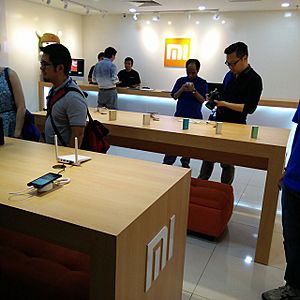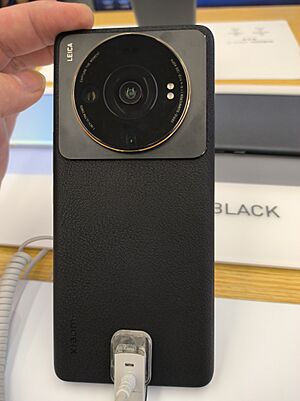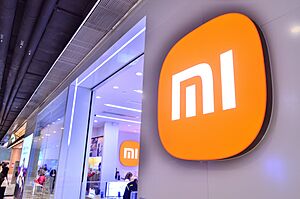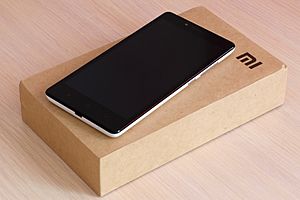Xiaomi facts for kids

Headquarters in Beijing
|
|
|
Trade name
|
Mi |
|---|---|
|
Native name
|
小米
|
|
Romanized name
|
Xiǎomǐ |
| Public company | |
| Traded as |
|
| Industry |
|
| Founded | 6 April 2010 |
| Founders |
|
| Headquarters | , |
|
Area served
|
Worldwide |
|
Key people
|
|
| Products | |
| Brands |
|
| Revenue | (2024) |
|
Operating income
|
|
| Total assets | |
| Total equity | |
|
Number of employees
|
33,627 (31 December 2023) |
| Subsidiaries |
|
| Xiaomi | |||||||
|---|---|---|---|---|---|---|---|

"Xiaomi" in Chinese characters
|
|||||||
| Chinese | 小米 | ||||||
| Literal meaning | Millet | ||||||
|
|||||||

Xiaomi (Chinese: 小米集团) is a big technology company from China. It makes many cool things like smartphones, computers, and even electric cars! You might know them for their smartphones, which are some of the most popular in the world. In fact, as of 2025, Xiaomi is the third-largest smartphone seller globally, right after Apple and Samsung. Most of their phones use their own special operating system called Xiaomi HyperOS. Xiaomi is also one of the youngest companies to be listed on the Fortune Global 500 list, which ranks the biggest companies in the world. Some people even call it the "Apple of China" because of its innovative products.
Xiaomi started in 2010 in Beijing. At first, the company only sold its products online. Later, they opened physical stores where people could see and buy their products. By 2015, Xiaomi was making a wide variety of electronics. In 2020, they sold almost 150 million smartphones. Their Xiaomi HyperOS operating system has over 500 million users every month. As of August 2024, Xiaomi was the second-largest smartphone seller worldwide. They also make wearable devices, televisions, flashlights, drones, and smart home devices that connect to the Internet of things.
Xiaomi tries to keep its prices low, close to what it costs to make their products. They do this by keeping most products on the market for about 18 months. This is longer than many other smartphone companies. They also manage their stock carefully and use "flash sales" to sell products quickly.
Xiaomi says the "MI" in their logo can mean "Mobile Internet" or "Mission Impossible." This is because the company faced many tough challenges when it started.
Contents
The Story of Xiaomi
How Xiaomi Started (2010-2013)
Xiaomi was founded on April 6, 2010, by Lei Jun and six other people. Lei Jun had a lot of experience in technology companies before starting Xiaomi. He felt that other mobile phones weren't good enough and believed he could create better ones.
In August 2010, Xiaomi launched its first software, MIUI, which is based on Android. This software is now called Xiaomi HyperOS. The company released its first phone, the Xiaomi Mi 1, in August 2011. This phone used their MIUI software.
In 2013, Xiaomi hired Hugo Barra from Google to help the company grow outside of China. By October 2013, Xiaomi was the fifth most popular smartphone brand in China. In that year, they sold 18.7 million smartphones.
Growing Bigger and Going Global (2014-2020)
In February 2014, Xiaomi announced it would expand beyond China, setting up an international office in Singapore. They bought the website address mi.com for a lot of money, making it their main website.
By December 2014, Xiaomi had become one of the most valuable private technology companies in the world. In 2014, they sold over 60 million smartphones. Most of their money came from phone sales that year.
Xiaomi started selling products in new countries like India and the European Union (EU). In 2016, they also bought patents from Microsoft. They opened their first Mi Stores in places like India, Pakistan, Bangladesh, and Greece. By late 2017, Xiaomi became the biggest smartphone brand in India.
In 2018, Xiaomi launched a gaming phone brand called Black Shark. They also introduced POCO as a line of affordable smartphones with high-end features. The company opened a new headquarters in Beijing in July 2019. In October 2019, Xiaomi announced plans to release many 5G phones in 2020. They also entered the Japanese market in November 2019.
In March 2020, Xiaomi showed off its first foldable phone, the Mi Mix Fold. They also demonstrated a new fast wireless charging technology that could fully charge a phone in just 40 minutes. By October 2020, Xiaomi became the third-largest smartphone maker globally by how many phones they shipped.
Recent Innovations and Achievements (Since 2021)
On March 30, 2021, Xiaomi announced a huge plan to invest US$10 billion in electric vehicles over the next ten years. They also revealed a new company logo designed by a famous Japanese designer.
In July 2021, Xiaomi became the second-largest smartphone maker in the world. They even passed Apple in Europe for the first time. In August 2021, the company bought an autonomous driving company called Deepmotion.
In December 2021, Xiaomi launched the Xiaomi 12 and Xiaomi 12 Pro phones, which use a powerful new chip. In April 2022, Xiaomi joined the Car Connectivity Consortium (CCC) board, which works on connecting cars to other devices.
In July 2022, Xiaomi and its POCO brand together held 42% of the smartphone market in Russia, making them number one there. In August 2022, Xiaomi Group ranked 266th on the Fortune Global 500 list, moving up 72 spots from the year before.
In December 2022, Xiaomi announced that they had sold over 300 million Redmi Note series phones worldwide. In February 2023, Redmi showed off a super-fast 300W charging technology. It could charge a phone battery to 50% in just over 2 minutes and fully charge it in 5 minutes!
In September 2023, Xiaomi and Huawei agreed to share patents for various communication technologies, including 5G. In May 2025, Lei Jun announced that Xiaomi's independently developed processor chip, XRING O1, was released. It was installed on the Xiaomi 15S Pro and Xiaomi Pad 7 Ultra. On June 26, 2025, Xiaomi Auto's first SUV model, the Xiaomi YU7, was officially launched.
In 2025, the World Intellectual Property Organization (WIPO) ranked Xiaomi 8th globally for the number of patent applications published in 2024.
How Xiaomi Works
Business Growth
Here's a quick look at Xiaomi's financial growth over the past few years:
| Revenue (HKD bn) | Net profit (HKD bn) | |
|---|---|---|
| 2019 | 233 | 11.3 |
| 2020 | 276 | 22.8 |
| 2021 | 395 | 23.3 |
| 2022 | 325 | 2.8 |
| 2023 | 299 | 19.3 |
Company Identity
What Does the Name "Xiaomi" Mean?
The word Xiǎomǐ (小米) in Chinese means "millet" (a type of grain). In 2011, CEO Lei Jun explained that the name has deeper meanings. He said the xiǎo part, meaning "small," relates to a Buddhist idea that "a single grain of rice is as great as a mountain." This means Xiaomi wants to start with small steps and improve constantly, rather than trying to be perfect from the beginning. The mǐ part is also an acronym for "Mobile Internet" and "mission impossible," referring to the big challenges the company faced. Lei Jun also mentioned he thought the name was cute!
Logos and Mascots
Xiaomi's first logo was an orange square with white "MI" letters. This logo was used until March 31, 2021. Then, a new logo was introduced, designed by a famous Japanese designer named Kenya Hara. The new logo looks similar but has softer, rounded corners, making it a "squircle" shape. The "MI" letters stayed the same.
Xiaomi's mascot is a white rabbit named Mitu. It wears a special hat (like a Lei Feng hat in China) with a red star and a red tie. Later, the red star on its hat was replaced with the company's logo.
Innovation and New Ideas
On February 8, 2022, Lei Jun announced that Xiaomi plans to become a top seller of high-end smartphones in China within three years. To do this, Xiaomi is investing a lot of money (US$15.7 billion) in research and development (R&D) over five years. They want their products to be as good as Apple's.
In 2022, Xiaomi showed off a prototype of its humanoid robot to the public. This shows the company's goal to use AI in its products and develop advanced robots in the future.
In April 2025, Xiaomi released its MiMo-7B reasoning model, joining the race in Artificial Intelligence.
Xiaomi and Electric Vehicles
In 2021, Xiaomi announced it would invest US$10 billion in electric vehicles (EVs). In late 2023, Xiaomi Auto showed its first car, the Xiaomi SU7. They also shared a goal to become one of the five biggest car makers in the world. On March 28, 2024, Xiaomi officially launched the SU7 sedan. Xiaomi's EV factory can produce an SU7 car very quickly, about one every 76 seconds, when it's running at full speed.
Working with Others

In 2021, Xiaomi worked with Harman Kardon to put special speakers in its Xiaomi Mi 11 series smartphones. These were the first phones to have Harman Kardon-tuned dual speakers.
Xiaomi also started working with directors to make short films using their Xiaomi Mi 11 phones. In 2022, they made two films with Jessica Henwick. One of them, Bus Girl, won several awards.
In 2022, Leica Camera partnered with Xiaomi to create special Leica cameras for Xiaomi's top smartphones. The first phones with these cameras were the Xiaomi 12S Ultra and Xiaomi MIX Fold 2, launched in 2022.
Xiaomi also opened a mobile phone factory in Pakistan on March 4, 2022, to start making phones there.
Helping Other Companies Grow
Xiaomi's CEO likes to make many different kinds of products, not just phones. To do this, they invest in and help small brands and startups. These smaller companies often start by making products just for Xiaomi, which are then sold under the Xiaomi brand. As they learn and grow, these companies might create their own brands and products. Some examples of companies Xiaomi has helped include:
- Huami: Makes the Mi Band fitness trackers.
- ZMI: Creates power banks, chargers, and cables.
- Mijia: Focuses on smart home devices.
- 70mai: Makes car dashboard cameras and power stations.
- MiniJ: Produces smart washing machines and refrigerators.
- XiaoYi (YI Technology): Specializes in home security cameras.
See also
 In Spanish: Xiaomi para niños
In Spanish: Xiaomi para niños
 | James B. Knighten |
 | Azellia White |
 | Willa Brown |









